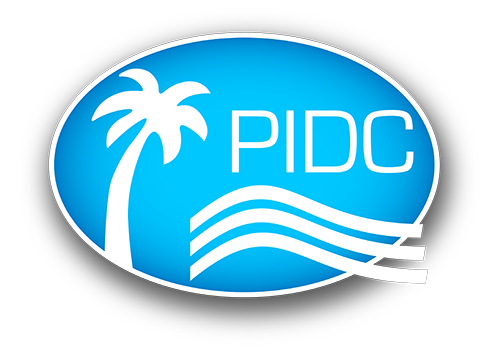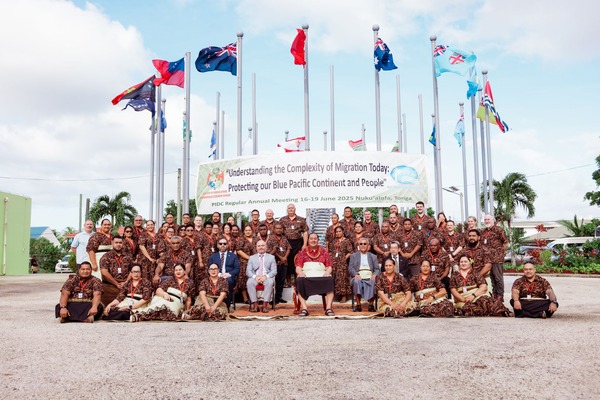The 27th Pacific Immigration Development Community (PIDC) Regular Annual Meeting (RAM) hosted by the Kingdom of Tonga’s Ministry of Foreign Affairs in Nukualofa, Tonga on 17 – 20 June 2025 brought together heads of immigration agencies and senior officials from across the Pacific region to deliberate on key issues shaping immigration and border management, strengthening regional cooperation, and to reaffirm the PIDC Memberships shared commitments to sustainable and secure mobility.
The theme of the conference was “Understanding the complexity of Migration Today: Protecting our Blue Pacific Continent and People”. 20 Member states and territories attended including: Tonga (Chair), Republic of Fiji, (Incoming Vice Chair) Solomon Islands (Outgoing Vice -Chair), Australia, Cook Islands, Federated States of Micronesia, French Polynesia, Kiribati, Nauru, New Caledonia, New Zealand, Niue, Palau, Papua New Guinea, Republic of the Marshall Islands, Samoa, Tonga, Tokelau, Tuvalu, Vanuatu and Wallis and Futuna.
The conference also welcomed representatives of Observer organisations from the Pacific Islands Chiefs of Police (PICP), Oceania Customs Organisation (OCO), Pacific Islands Fusion Centre (PFC), the Pacific Transnational Crimes Coordination Centre (PTCCC), International Organization for Migration (IOM), United Nations High Commissioner for Refugees (UNHCR), United Nations Office on Drugs and Crime (UNODC) and the PACER Plus Implementation Unit
(PPIU).
OPENING
The Regular Annual Meeting was opened by His Excellency, His Royal Highness, The Crown Prince Tupoutou’ ‘Ulukalala Minister of Foreign Affairs who welcomed delegates and official observers to the 27th Pacific Immigration Development Community RAM. HRH The Crown Prince Tupoutou’ ‘Ulukalala in his opening remarks, welcomed delegates and highlighted the increasing complexity of migration across the region. He called for strengthened collaboration, smarter systems, and collective resilience to address emerging mobility pressures while ensuring the protection and empowerment of Pacific peoples. His address reaffirmed the Government of Tonga’s commitment to the principles of regional unity, mutual support, and responsible border governance.
The conference theme, “Understanding the Complexity of Migration Today: Protecting Our Blue Pacific Continent and People,” provided a timely opportunity for members against an evolving global and regional migration landscape to reflect on the dynamics of these landscape against a backdrop of limited resources and capacity across the Pacific. Discussions underscored the shared responsibility of immigration agencies to ensure that the Pacific’s borders remain secure, its people protected, and its values preserved, even amidst an increasingly interconnected and fast-changing global migration landscape.
STATEMENT BY THE CHAIR
The Chair, Ms Telesia Fakava-Kaitapu thanked the outgoing Chair Mr Christopher Akosawa, Director Immigration Solomon Islands for his leadership during his tenure as the PIDC Chair for the 2024/25 Financial period.
She stated that PIDC’s objectives for the year ahead, included the development of PIDC’s new strategic plan to be reflective of member needs and the changing operating landscape, the successful completion of PIDC’s new workplan, with mitigation against the revolving border threats as a central focal point of PIDC’s strategic objectives to ensure a safe and prosperous Pacific region and in particular the immigration aspects of transnational organised crime and the collective efforts of members to protect our shared borders.
THEMATIC ISSUES CONSIDERED BY THE 27TH PACIFIC IMMIGRATION DEVELOPMENT COMMUNITIES REGULAR ANNUAL MEETING
SECRETARIAT’S REPORT
Members welcomed the Secretariat’s workplan activity report for the 2024-25 period noting in particular a number of initiatives successfully delivered by PIDC including: (i) PIDC Policy and Legislation Review Programme ongoing success in supporting members legislation review and modernisation programme; (ii) successful member website development programme with members visibility and service accessibility improved immensely; (iii)successful Strategic Plan development support programme with members launching their respective department first ever strategic plans; (iv) establishment of new key technical working group committee to provide technical advisory support to the membership on ICAO related requirements on travel documents and technology development; (v) substantial progress on the development and launching of the global first PIDC Reporting and Information Sharing Platform (RISP) with IOM, now being piloted with 10 member countries; (vi) establishment of a PIDC-ICAO Technical Working Group for monitoring purposes of ICAO mandated developments on travel documents and border technologies and the (vi)successful launching of the PIDC financed and supported USP Masters in Border Security Course, an immigration specific developed course targeting immigration and border control stakeholders across the Pacific and the review and implementation of a number of PIDC foundational documents including the PIDC Partnership and engagement policy.
PIDC FUNDING
Members recognised the financial support provided by Australia and New Zealand since the establishment of the PIDC and thanked them for their continuing commitment to the organisation. Members also thanked the in-kind support provided by the Government of Samoa for the Secretariat offices. More importantly, members acknowledged with appreciation PIDC’s new funding support from the Papua New Guinea Immigration and Citizenship Services Authority (PNGICSA), ensuring sustained programme delivery and capacity building initiatives for members over the next four years.
MEMBER COUNTRY REPORTS
Country reports were presented by Australia, Cook Islands, FSM, French Polynesia, Fiji, Kiribati, Marshall Islands, Nauru, New Caledonia, New Zealand, Niue, Papua New Guinea, Samoa, Solomon Islands, Tuvalu, Tokelau, Tonga, Vanuatu and Wallis and Futuna. Members agreed on the commonalities on immigration issues in the Pacific, and the need to work together to monitor and protect our shared borders. Country presentations revealed both common challenges and unique national experiences. Members reaffirmed the value of PIDC as a platform for mutual support, regional dialogue, and coordinated solutions to shared immigration priorities. Members agreed to address issues raised during the discussion via the PIDC Board, and to analyse the challenges and opportunities that emerged from the country reports.
REGIONAL INFORMATION SHARING AND REPORTING PLATFORM
Participants welcomed the development of a new regional reporting and information sharing platform, tailored to PIDC members’ operational and strategic information sharing needs. The platform developed in partnership with IOM was recognised as a key tool to support harmonised data collection across the PIDC Membership, informed decision-making, and enhanced inter-agency collaboration. More importantly, the platform provided the analytical capability for members to monitor accurate movement trends across the Pacific region.
LABOUR MOBILITY RESEARCH
Members discussed immigration’s central role in facilitating and monitoring successful labour mobility schemes that strengthen economic development for Pacific communities and noted the impacts of relevant multi-lateral agreements. Consequently, the meeting welcomed the initial findings of the PIDC-IOM labour mobility research project, which provided early insights into the immigration-specific elements needed to strengthen mobility schemes. These findings are expected to inform more responsive and supportive immigration frameworks for labour mobility schemes in the region both as a receiving and sending country.
IMMIGRATION LEGISLATION REVIEW
Members recognised that immigration legislation must continue to evolve to remain effective and future-proofed ready. The importance of inclusive, consultative reform processes was highlighted, with emphasis on ensuring that legislative changes are proactive, resilient, and grounded in domestic, regional and international realities.
TECHNOLOGY IN IMMIGRATION OPERATIONS
The meeting affirmed the critical role of technology in enhancing immigration processes, integrity, and efficiency in addition to the investment in human capacity to sustain the evolving immigration specific technology needs of members operating environment. Members also discussed the substantial cost implications of adopting and sustaining new systems, and the importance of long-term planning to ensure value for investment.
WOMEN IN LEADERSHIP
Delegates acknowledged the progress made in advancing women into leadership roles across immigration agencies in the Pacific and recognizing the large representation of women in Director leadership positions across the PIDC membership. Challenges faced by women leaders were candidly discussed, and the meeting called for sustained investment in leadership development and gender-inclusive policies across the Pacific.
EVOLVING REGIONAL BORDER THREATS
Members acknowledged the ongoing shifts in the region’s border environment, noting growing pressures on immigration and border control systems to manage legal movement effectively. The discussions reinforced the need for adaptable, well-resourced national systems and strong regional coordination. Participants expressed concern over the rise of complex border threats, including transnational crime and irregular migration. There was strong consensus on the need for joint intelligence sharing efforts, capacity-building, and coordinated responses to emerging risks. Members discussed challenges in managing the return and reintegration of deportees across Pacific states. The meeting called for greater collaboration in building structured and coordinated reintegration strategies that respect both security needs and social impacts. Additionally, members recognized the need to share information to effectively monitor increasing complexities to evolving regional border threats.
CONCLUSION
The 2025 PIDC Regular Annual Meeting concluded with members affirming the relevance and urgency of this year’s conference theme. Delegates agreed that achieving effective migration governance in the Pacific requires collective action, sustained partnerships, evidence-based policymaking, and a steadfast commitment to the PIDC Membership values and priorities.
Participants expressed appreciation for the open and solutions-focused discussions and acknowledged the Kingdom of Tonga’s warm hospitality and leadership in hosting the meeting. Members reaffirmed PIDC’s central role as a trusted regional immigration forum for open dialogue, capacity-building and regional strategy.
The Chair expressed sincere gratitude to all participants for their engagement, cooperation, and contributions. The meeting concluded with a strong sense of solidarity and a renewed commitment to advancing Pacific-led solutions to the challenges and opportunities of migration today.
ELECTION OF NEW PIDC BOARD
Members welcomed Board Members elected for the 2025-26 financial period including Tonga (Chair), Fiji (Incoming Vice Chair), Solomon Islands (Outgoing Vice-Chair), Papua New Guinea (Melanesia), Tokelau (Polynesia), Nauru (Micronesia), Cook Islands (Small Islands States), Samoa (host country) and the Principal Donors Australia and NZ.
2026 REGULAR ANNUAL MEETING
The Conference welcomed and endorsed the invitation by the Republic of Fiji to host the 28th PIDC Regular Annual Meeting in 2026.

